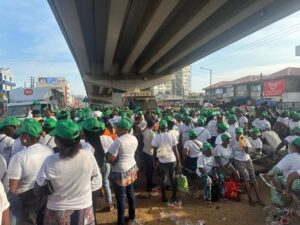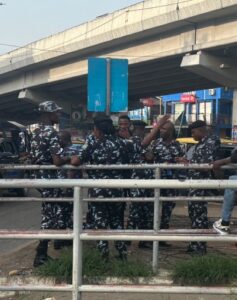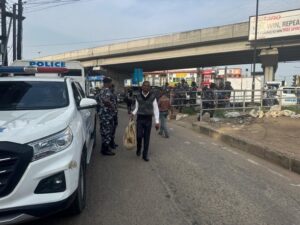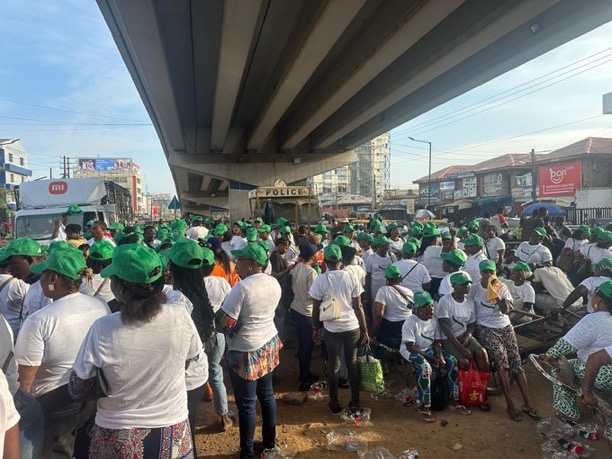Hundreds of protesters converged at Ikeja Underbridge in Lagos, Nigeria, to commemorate Democracy Day while voicing grievances over economic challenges and governance issues under President Bola Tinubu’s administration. The demonstration, organized by groups such as the #EndBadGovernance Movement and other civil society organizations, highlighted widespread frustration with soaring inflation, fuel price hikes, and perceived erosions of civil liberties. Despite the peaceful intent declared by organizers, the heavy presence of security forces, including the Nigeria Police Force, Nigerian Security and Civil Defence Corps, and Lagos Neighborhood Safety Corps, created a tense atmosphere.
The protest was led by prominent activists, including members of the Take It Back Movement and the Revolutionary Youths of Nigeria, who sought to march from Ikeja Underbridge to Gani Fawehinmi Park in Ojota, a venue designated by the Lagos State Government for public demonstrations. Prior to the event, the Lagos State Commissioner of Police, Adegoke Fayoade, met with protest leaders to ensure compliance with public safety regulations, emphasizing the need for non-violent conduct. However, police warnings issued days earlier, citing potential infiltration by hoodlums, heightened concerns among organizers about possible disruptions.

Security forces were deployed in large numbers, with armed officers stationed at strategic points around Ikeja Underbridge and along the planned protest route. Reports indicated the presence of tactical units, including the Rapid Response Squad, and surveillance teams monitoring the crowd for any signs of unrest. The heavy security deployment was partly in response to recent intelligence suggesting that protests could be hijacked by individuals intent on causing chaos, a recurring concern during public demonstrations in Lagos.
Concurrently, a pro-government rally organized by supporters of President Tinubu, identifiable by their “Team Nigeria for Change” T-shirts, took place at the same location, adding to the complexity of the situation. These supporters praised the administration’s economic reforms, such as the removal of fuel subsidies and efforts to stabilize the naira, which they argued were necessary for long-term growth. The juxtaposition of opposing groups at Ikeja Underbridge underscored the polarized sentiments surrounding Nigeria’s current political and economic landscape.

Protesters carried placards with messages decrying the rising cost of living, with specific references to food inflation, which has reached over 40% according to recent economic data, and the impact of recent policy decisions on ordinary Nigerians. Chants of “Tinubu must go” and “End bad governance” echoed through the crowd, reflecting deep dissatisfaction with the administration’s handling of economic reforms. Organizers, including human rights lawyer Inibehe Effiong, emphasized that the protest was a constitutional right and called for security forces to respect the demonstrators’ freedom of expression.
The Lagos State Government, in a statement issued prior to June 12, had designated Gani Fawehinmi Park as the approved venue for protests to minimize disruptions in high-traffic areas like Ikeja. Despite this, the choice of Ikeja Underbridge as a starting point was strategic, given its visibility and accessibility, making it a focal point for public gatherings in Lagos. The government’s decision to limit protest locations has been a point of contention, with activists arguing it restricts their ability to effectively communicate their grievances.
Security operatives are maintaining a visible presence, with reports of minor scuffles between police and some protesters who attempted to deviate from the agreed route. No major incidents of violence were reported by midday, but the heavy police presence was criticized by some activists as an intimidation tactic. The Nigeria Police Force, in a statement, defended their deployment, stating it was necessary to maintain law and order while protecting the rights of all citizens, including those not participating in the protest.

The #EndBadGovernance Movement, one of the key organizers, issued a press release outlining their demands, which included a reversal of the fuel subsidy removal, immediate action to address food insecurity, and greater transparency in government spending. The movement also called for the release of protesters arrested during previous demonstrations, citing concerns over alleged human rights abuses by security forces. These demands resonated with many attendees, particularly young Nigerians who form the backbone of the protest movement and are disproportionately affected by unemployment and economic hardship.
In a parallel development, the pro-Tinubu rally attracted a smaller but vocal crowd, who argued that the administration needed more time to implement its economic policies. They pointed to initiatives like the student loan scheme and infrastructure projects as evidence of progress, urging Nigerians to remain patient. The presence of these supporters, however, drew criticism from anti-government protesters, who accused them of being sponsored by political actors to counter the demonstration’s momentum.
The protest coincided with Democracy Day, a national holiday commemorating Nigeria’s return to civilian rule in 1999, adding symbolic weight to the event. Activists used the occasion to draw parallels between current governance challenges and the struggles against military rule in the 1990s, invoking the legacy of figures like Gani Fawehinmi and Moshood Abiola. Speeches delivered at the protest site emphasized the need for accountability and democratic reforms to address systemic issues like corruption and inequality.
As the day progressed, social media platforms buzzed with updates from the protest, with hashtags like #EndBadGovernance and #June12Protest trending in Nigeria. Videos and images shared by attendees showed a diverse crowd, including students, labor union members, and market women, united in their call for change. However, some posts also highlighted the heavy police presence, with users expressing concerns about potential clampdowns on peaceful protesters.
The demonstration at Ikeja Underbridge was part of a broader wave of protests planned across Nigeria, with similar gatherings reported in Abuja, Port Harcourt, and Ibadan. In Lagos, the epicenter of Nigeria’s economic and political activities, the protest drew significant attention, with local and international media outlets covering the event. Analysts noted that the turnout, while substantial, was smaller than previous protests like the 2020 #EndSARS movement, possibly due to public fatigue or fear of repression.
By late afternoon, the march to Gani Fawehinmi Park proceeded under close police supervision, with organizers maintaining discipline among protesters to avoid provocations. The Lagos State Government commended the peaceful conduct of the demonstration but reiterated its stance on maintaining order, warning against any attempts to disrupt public peace. The protest concluded without major incidents, though organizers vowed to continue their advocacy through further actions if their demands were not addressed.




